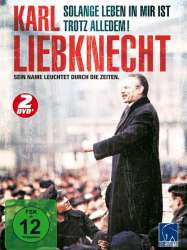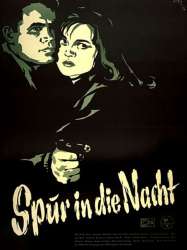The Sailor’s Song is a film of genre Drama directed by Kurt Maetzig with Günther Simon
The Sailor’s Song (1958)

If you like this film, let us know!
Length 2h6
Rating62%










The Sailor's Song (German: Das Lied der Matrosen) is an East German black-and-white film directed by Kurt Maetzig and Günter Reisch. It was released in 1958.
Synopsis
As the news of the October Revolution sweep through the world, the German High Seas Fleet's command, wary of a mutiny, decides to send all its ships to a suicide mission in the English Channel. Sailors Albin Köbis and Max Reichpietsch are sentenced to death for political activity. When the socialist sailor Steigert, a member of the firing detail, cannot bring himself to shoot them, he is arrested. On the cruiser Prince Heinrich, Steigert's friends Lenz, Lobke, Kasten and Bartuschek receive Vladimir Lenin's transmit to all of mankind calling for peace. Slowly, the sailors in Kiel — all members of different socialist parties: the Social Democrats, the Independent Socialists and the Spartakists — begin to realize the need for a revolution. The workers and the shipmates rebel against the officers, but the political gaps between them lead the uprising to a failure. In the end, many of the rebel sailors attend the foundation conference of the new Communist Party of Germany.Actors

Günther Simon
(Erich Steigert)

Raimund Schelcher
(August Lenz)

Ulrich Thein
(Henne Lobke)

Hilmar Thate
(Ludwig Batuschek)

Siegfried Weiss
(Hauptmann)
Comments
Leave comment :
Suggestions of similar film to The Sailor’s Song
There are 64 films with the same actors, 31 films with the same director, 63015 with the same cinematographic genres (including 4077 with exactly the same 2 genres than The Sailor’s Song), 13460 films with the same themes (including 716 films with the same 3 themes than The Sailor’s Song), to have finally 70 suggestions of similar films.If you liked The Sailor’s Song, you will probably like those similar films :
 , 2h4
, 2h4Directed by Kurt Maetzig, Konrad Wolf
Genres Drama, Biography, Historical
Themes Politique, Political films
Actors Günther Simon, Wolf Kaiser, Werner Peters, Raimund Schelcher, Erika Dunkelmann, Nikolai Kryuchkov
Rating62%





After fellow soldier Johannes Harms reports that a revolution has broken out at home, Thälmann - who leads a revolutionary cell on the Western Front - and his friend Fiete Jansen rebel against their officers, Zinker and Quadde, and desert. Harms dies in a shelling. In Berlin, the American capitalist Mr. McFuller demands to crush the Spartacists. Zinker, now a member of the Freikorps, murders Karl Liebknecht and Rosa Luxemburg. Thälmann hears of it and promises their sacrifice will not be in vain. Jansen falls in love with Harms' daughter, Änne.

At a French Fireside (1962)
, 1h39Directed by Kurt Maetzig
Genres Drama
Themes Political films
Actors Angelica Domröse, Hannjo Hasse, Günther Simon
Rating65%





Bundeswehr soldier Klaus' regiment is stationed in France, to take part in NATO maneuvers. The soldiers are ordered to be kind to the populace, since the West German High Command wishes the French to forget the atrocities that were committed during the Second World War. Klaus falls in love with Jeanne, the daughter of the local mayor. He discovers that his commanders intend to demolish the ruins of a local church, in which civilians were murdered by the German occupation forces at 1944. A local journalist who researches the event discovers that West German General Rucker ordered the massacre, but he is mysteriously murdered. Klaus defies his commanding officer Siebert, who instructs him to steal the documents indicting Rucker, and hands the evidence over to Jeanne.
 , 1h54
, 1h54Directed by Günter Reisch
Genres Drama, Biography, Historical
Themes Politique, Political films
Actors Mikhaïl Oulianov, Albert Hetterle, Jutta Hoffmann, Erika Dunkelmann, Zofia Mrozowska, Siegfried Weiss
Rating72%





 , 2h20
, 2h20Directed by Kurt Maetzig, Konrad Wolf
Genres Drama, Biography, Historical
Actors Günther Simon, Raimund Schelcher, Michel Piccoli, Werner Peters, Theo Shall, Erika Dunkelmann
Rating63%





L'action commence en 1930 et se termine par l'assassinat de Thälmann en 1944.

The Fiancee (1980)
, 1h23Directed by Günter Reisch
Genres Drama
Themes Political films
Actors Jutta Wachowiak, Inge Keller, Regimantas Adomaitis, Slávka Budínová, Katrin Sass, Ewa Ziętek
Rating69%






Marriage in the Shadows (1947)
, 1h44Directed by Kurt Maetzig
Genres Drama
Themes Films about religion, Political films, Films about Jews and Judaism
Actors Ilse Steppat, Claus Holm, Hans Leibelt, Karl Hellmer, Willy Prager
Rating71%





Actor Hans Wieland refuses to divorce his actress wife, Elisabeth, who is Jewish, even as extreme pressure is applied on him by the Nazi authorities. He even takes her to a premiere of one of his films where she is unwittingly introduced to a high Nazi Party official. Upon later discovering that the charming woman at the premiere was in fact Jewish, he orders her arrest. Hans Wieland is given an ultimatum by his former friend Herbert Blohm, now a Nazi official at the Reichskulturministerium (culture ministry), to save himself by divorcing his wife. Knowing that his wife will die in a concentration camp, Hans Wieland returns home and they drink poison in coffee whilst reciting the closing scene of Friedrich Schiller's tragic play Kabale und Liebe together.
 , 1h54
, 1h54Directed by Günter Reisch
Genres Drama
Themes Political films
Actors Albert Hetterle, Erika Dunkelmann, Siegfried Weiss, Hans Finohr, Adolf Fischer, Werner Dissel
Rating72%





The film opens in Berlin in 1914, as Germany is preparing for World War I. Liebknecht (Schulze) receives a call from a fellow lawyer and revolutionary, Mr. Rauch, that documents have been found proving the German heavy arms industry's secret involvement in the buildup to the war. He brings these documents to a meeting of the Reichstag, accusing Gustav Krupp and his company of bribing officials to release military secrets. In addition to this, Krupp and his company wrote to ask the French media to state that the French military has twice as much artillery as they actually possess so that they may provoke a surge in militarism. Afterward, while celebrating a friend's wedding, Liebknecht learns of the assassination of Archduke Franz Ferdinand, recognizing that this is the war the German imperialists were seeking. However, the resources for war still need to be approved. Liebknecht immediately begins campaigning among the public, denouncing the war as a means to secure profit for the capitalists. In an SPD party meeting, Liebknecht is one of only fourteen members to vote against the war credits. In the subsequent Reichstag meeting, he votes with the party discipline in favor of the war credits, to the public's surprise. He announces in the party meetings that he will no longer yield to party discipline and will stand by his anti-militarist principles even if the party leadership will not do the same. Liebknecht is the only one of the Reichstag — including 111 SPD representatives — to vote against the war loans, resulting in a number of death threats and work bans. Despite his immunity as a Reichstag member, Liebknecht is called to serve on the front as a sapper. It is here that he writes his 1915 manifesto, "The main enemy is at home!" The manifesto is passed among his fellow soldiers on the front before returning home. While he is away, Paul Schreiner, whose wedding Liebknecht attended earlier in the film, dies on the front. This leaves his wife Käthe to raise their newborn child alone and make Liebknecht's manifesto public.

The Track in the Night (1957)
Directed by Günter Reisch
Genres Drama, Crime
Actors Ulrich Thein, Raimund Schelcher, Annekathrin Bürger, Friedrich Gnaß, Albert Hetterle

Castles and Cottages (1957)
, 3h23Directed by Kurt Maetzig
Genres Drama
Actors Raimund Schelcher, Erika Dunkelmann, Erwin Geschonneck, Helga Göring, Hans Finohr, Ulrich Thein
Rating67%





In a feudal estate in Mecklenburg, the hunchback coachman Anton Zuckman married maid Marthe, who was pregnant with Baron von Holzendorf's illegitimate child, in exchange for a letter promising that the baron would recognize his offspring when it would wed and endow it with 5000 Mark. Marthe gave birth to a daughter, Anna, nicknamed Annegret.
 , 1h26
, 1h26Directed by Kurt Maetzig
Genres Drama, Comedy
Actors Erna Sellmer, Sabine Thalbach, Günther Simon, Manfred Krug, Katharina Matz
Rating63%





Traudel is a war orphan, whose mother had died in the Ravensbrück concentration camp after refusing to renounce her love for a Czechoslovak prisoner. The only remnant the daughter has from her mother is a letter ending with the words "don't forget me, my little Traudel". When she turns seventeen, she flees the orphanage and ventures to Berlin, where she meets policeman Hannes, who falls in love with her and even forges documents for her. He is caught, but is only slightly reprimanded, and marries her.
 Connection
Connection